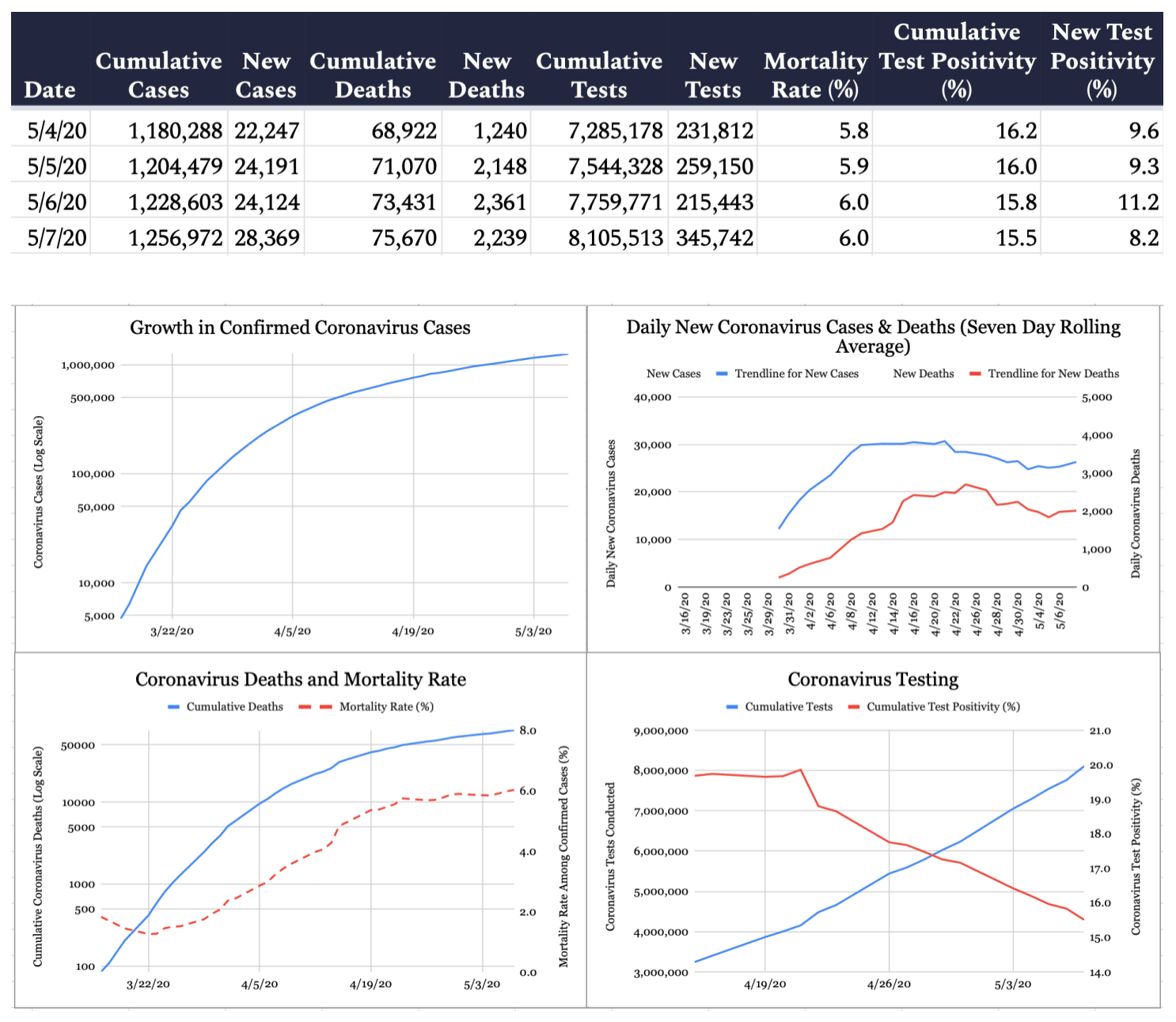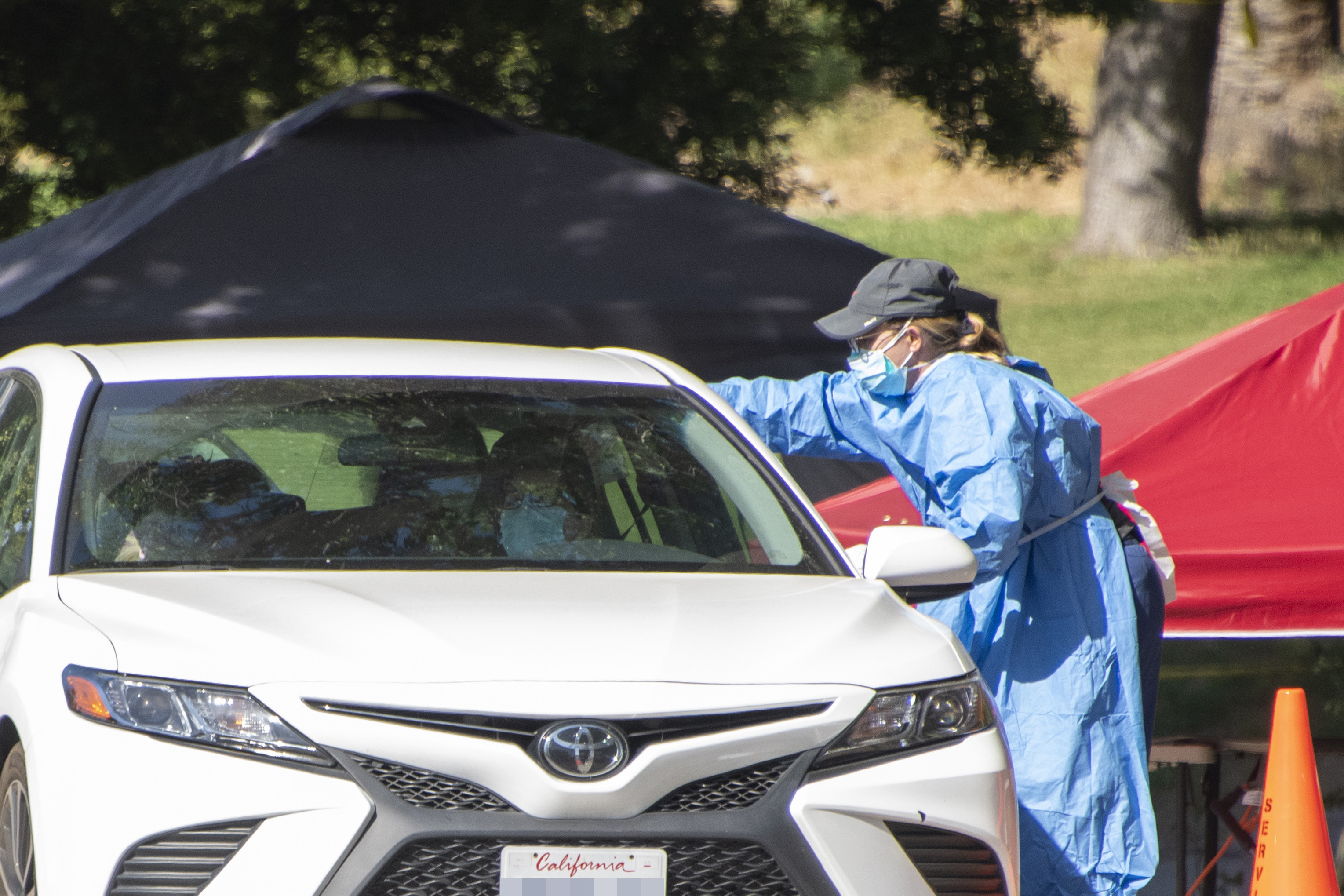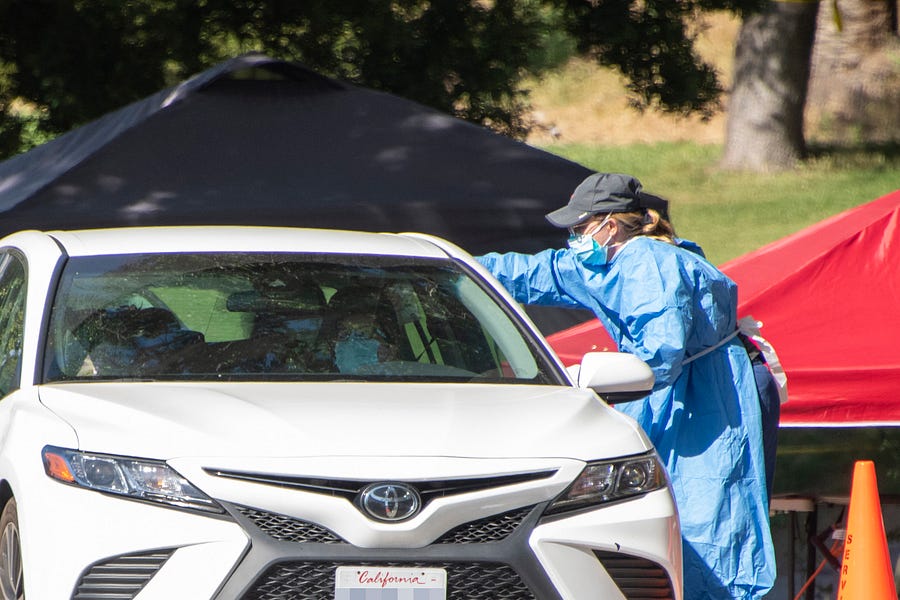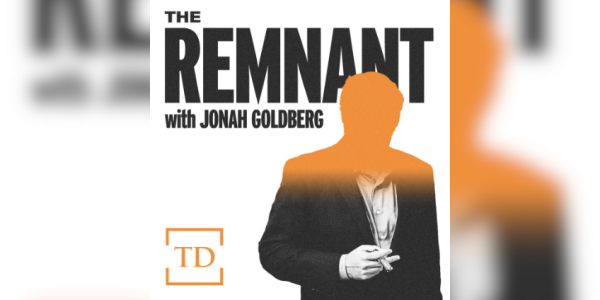Happy Friday! Thanks for being you.
Quick Hits: Today’s Top Stories
-
As of Thursday night, there are now 1,256,972 confirmed cases of COVID-19 in the United States (an increase of 28,369/2.3 percent since yesterday) and 75,670 deaths (an increase of 2,239/3 percent increase since yesterday), according to the Johns Hopkins University COVID-19 Dashboard, leading to a mortality rate among confirmed cases of 6 percent (the true mortality rate is likely lower, but it’s impossible to determine precisely due to incomplete testing regimens). Of 8,105,513 coronavirus tests conducted in the United States (345,742 conducted since yesterday), 15.5 percent have come back positive.

-
Gregory McMichael and his son Travis were arrested on Thursday, and will face murder and aggravated assault charges in the shooting death of Ahmaud Arbery—a 25-year-old African-American jogging through Brunswick, Georgia. The shooting took place on February 23, but the arrests came two days after a local radio host released a video of the incident.
-
The Department of Justice dropped its prosecution of Michael Flynn, former national security adviser to President Trump.
-
Tara Reade told Megyn Kelly she wishes the former vice president would drop out of the race. “Please step forward and be held accountable,” she said. “You should not be running on character for the president of the United States.” Biden responded in an interview with Spectrum Bay News 9 in Tampa, Florida: “Nothing ever happened with Tara Reade. Believing women means taking a woman’s claim seriously when she steps forward and then vetting it, looking into it. … But in the end, in every case, the truth is what matters. And in this case, the truth is the claims are flat out false.”
-
The Supreme Court overturned the convictions of Bridget Anne Kelly and Bill Baroni on wire fraud and other federal charges stemming from their involvement in the New Jersey “Bridgegate” scandal back in 2013, in which they closed access lanes to the George Washington Bridge to punish a political opponent of their boss, Gov. Chris Christie. Justice Kagan, writing for a unanimous court, held that—despite evidence of wrongdoing and abuse of power—Baroni and Kelly could not have violated the federal wire fraud laws because the goal of their scheme was not to obtain money or property.
-
Another 3.2 million Americans filed for unemployment benefits last week, bringing the total since the coronavirus pandemic struck to 33.5 million. The April jobs report will be released later this morning, and is expected to show record-high unemployment.
-
Department store chain Neiman Marcus formally declared bankruptcy on Thursday, joining clothier J. Crew, which did the same earlier this week. Neiman Marcus said it hopes to reemerge from bankruptcy by fall of this year.
Testing Is On The Upswing Again. Not a Moment Too Soon.

Seven weeks into our lockdown, there’s no question Americans have made great strides toward slowing the virus’s spread and saving untold lives. But as we’ve been saying all along, those efforts may prove wasted if the nation—the states, or the federal government, or both—can’t manage to deploy a sufficiently robust testing apparatus to track the presence of the virus and snuff out smaller outbreaks before they turn into hotspots. Now that the reopening is beginning, is our testing ready to stand up to the task? Unfortunately, while the outlook has gotten far better, the answer at this point still appears to be: not yet.
Now, there’s a lot of good news to report about the ways in which our testing operation has improved, especially in just the last few weeks. After ramping up steadily through late March, the number of tests being performed per day basically plateaued around 150,000 per day in mid-April amid reagent shortages and a backlog of test kits piling up at labs. Now we’re trending back in the right direction, thanks in large part to the rollout of serology testing—which tests for antibodies in the blood and is less labor-intensive to process—to go along with the earlier sinal swab PCR method. At least 200,000 tests have been performed every day since April 28, and yesterday’s 318,720 reported tests were the biggest single-day haul yet. That number is expected to grow in the days ahead.
“We do expect to continue to ramp up our capacity,” a spokesperson for Quest Diagnostics, one of the biggest labs processing coronavirus tests, told The Dispatch Thursday. “On the molecular diagnostic side—that’s the swabs that you have collected—we’re doing 50,000 roughly a day, and we’re running these labs 24/7, so 350,000 a week roughly. On the serology side we’re now able to do about 150,000 a day. And we do expect that we can significantly ramp capacity for both of those services.”
The difficulty with trying to play catch-up on testing is that the more the virus spreads, the bigger the testing operation needs to be. But there’s some hard evidence to show that we’re actually gaining ground on this front. Take another quick look at one of Declan’s graphs from the top of this newsletter:

That red line is what’s key here. As Andrew explained last month, the positivity rate is one of our best indicators about how widely we’re casting our testing nets: Reactive testing of patients already presumed sick returns much higher positive infection rates than does proactive testing of those who seem healthy. The more on-the-ball your testing operation is, the more of the latter you can do, and the lower the positivity rate goes. That metric actually got progressively less encouraging from the beginning of the outbreak until just a couple weeks ago—when, as you can see, the trend began improving considerably.
The bad news is that while we’re finally moving in the right direction again, it appears we’ve simply run out of time. The White House’s reopening road map contained testing and caseload benchmarks states needed to hit before they resumed types of economic activity that required expanded social mingling. These benchmarks were designed to help states get moving again as soon as possible—without immediately working themselves right back into a situation where viral cases spiked and another shutdown became necessary.
Now, however, it appears that political will has shifted again: Many states that are beginning the process of reopening are doing so despite failing to meet those standards, raising the specter of a new rash of infections. With a few more weeks of scaling up testing while working to keep new infections to a minimum, we might have really been able to get out ahead of the virus, which would have undoubtedly paid major dividends once the economy reopens in earnest. Now, there’s a substantial risk that our testing apparatus will simply be thrown back into a situation where it struggles not to lose ground again.
Flynn Set Free
Last Thursday, David dedicated his French Press (🔒) newsletter to recent developments in the case against President Trump’s former national security adviser, Michael Flynn. While Flynn wasn’t “exonerated” as the president and many of his supporters claimed, he concluded, “the case is far from over.”
Turns out, it wasn’t that far from over. The Department of Justice announced yesterday it is dropping the charges against Flynn after it determined that “continued prosecution of this case would not serve the interests of justice.”
Before we go any farther, let’s quickly recap how we got here. From David:
Flynn pleaded guilty to lying about contacts with foreign governments. He admitted lying to the FBI about his communications with the Russian ambassador to the United States prior to Trump’s inauguration. He also admitted to lying about his relationship with Turkey in a Foreign Agent Registration Act (FARA) filing with the Department of Justice.
Since that time, Flynn has changed attorneys, and his new attorneys are now seeking to withdraw his guilty plea. The new disclosures emerged in connection with Flynn’s effort to change his plea and assert his innocence.
And from last Friday’s Morning Dispatch:
Michael Flynn’s defense lawyer released notes this week taken by an unidentified FBI agent that include the controversial bullet point: “What is our goal? Truth/admission or to get him to lie, so we can prosecute him or get him fired.” She also released evidence that the FBI almost dropped the investigation against Flynn but that call was overridden by FBI leadership.
…
There’s a lot we don’t know about the notes, including who wrote them and what exactly they even mean. It is the FBI’s role to investigate crimes under federal law. It is not the FBI’s role to get people fired when they come up a little short proving a crime. But other parts of these notes call into question whether the FBI agent was actually advocating for this goal at all.
President Trump—who welcomed Thursday’s news by proclaiming Flynn an “innocent man” who “was targeted by the Obama administration”—had made clear he was “strongly considering” a pardon of his former national security adviser. But the Justice Department’s move—approved by Attorney General William Barr—will preclude Trump from ever having to make that potentially politically damaging decision.
“We think the case against Flynn for false statements should be dismissed,” Barr told CBS News’ Catherine Herridge in an interview. “A crime cannot be established here because there was not, in our view, a legitimate investigation going on. [Federal investigators] did not have a basis for a counterintelligence investigation against Flynn at that stage, based on a perfectly legitimate and appropriate call he made as a member of the transition.”
One leader of those federal investigators, obviously, did not agree with that assessment. “We opened the Russia investigation to determine if the Russian government coordinated with the Trump campaign. Mr. Flynn had prominent, high level interactions with Russian officials, so we investigated whether he might be that point of coordination,” former FBI Deputy Director Andrew McCabe said in a statement. “The Department’s position that the FBI had no reason to interview Mr. Flynn pursuant to its counterintelligence investigation is patently false, and ignores the considerable national security risk his contacts raised … Today’s move by the Justice Department has nothing to do with the facts or the law—it is pure politics designed to please the president.”
Barr was asked by Herridge if he was “doing the president’s bidding” by dropping the Flynn case. “No, I’m doing the law’s bidding,” he responded, contending that he was “not at all” influenced by President Trump’s repeated weighing in on the case.
“Efforts to use the law enforcement process to change leaders or to disable administrations are incendiary in this country and destroy our republic,” Barr said. “I hope [this move] sends the message that there is one standard of justice in this country. And that’s the way it will be. It doesn’t matter what political party you’re in, or, you know, whether you’re rich or poor. We will follow the same standard for everybody.”
Critics of the administration argued Barr was in fact playing the very politics he seemed to be decrying. Rep. Adam Schiff, a Democrat from California, accused Barr of “doing Trump’s dirty work” and concluded that Barr “has undermined the legitimacy of our justice system and the rule of law.”
U.S. District Judge Emmett Sullivan—who is presiding over Flynn’s case—could technically reject the Justice Department’s motion to dismiss, but such a move should be considered incredibly unlikely.
Worth Your Time
-
As with all major stories in the news, the coronavirus has proven an irresistible opportunity for the conspiracy theorists in our midst to get the bit in their teeth and just run with it. But as this Washington Post piece by two professors of communications, Leticia Bode and Emily Vraga, explains, it’s also turned many Americans into misinformation vigilantes, taking the time to push back on conspiratorial mutterings whenever they see it in their feeds. At a time when tech companies are pulling out their hair trying to figure out how to combat the problem of fake news on their platforms, the authors suggest this is probably just about the most effective solution there is.
-
Speaking of fake news, infamous right-wing fabulists and grifters Jacob Wohl and Jack Burkman were caught on tape admitting to paying a young woman to invent claims that she’d been sexually assaulted by Dr. Anthony Fauci. The pair have concocted a variety of schemes to smear the perceived enemies of Donald Trump, all of which have ended in embarrassment. In the Fauci fantasy, Wohl and Burkman claimed that Kevin Spacey would speak for the victim and that their press conference was to have been held at the Chinese embassy. Reason magazine’s Nancy Rommelman received an email from Diana Andrade, a onetime girlfriend of Wohl, who admitted she’d made up her story about Fauci. Andrade provided a recording of Wohl and Burkman admitting their deceptive scheme, including a five-figure payment.
-
For FiveThirtyEight, Perry Bacon Jr. writes about a strange political phenomenon: how erstwhile NeverTrump expats from the Republican party seem to be playing a bigger role shaping the Democratic nomination this time around than they did for their own race in 2016.
-
There’s been a lot of bad news lately. We get it—we’ve been delivering some lot of it to you. But even in non-global pandemic times, doesn’t it seem like things are doom and gloom more often than they ought to be? If you receive heaps of praise on a project or assignment, why does just one detractor have the power to ruin your day? Turns out, humans have a built-in “negativity bias” that—in our minds—weights the adverse things that happen to us much more heavily than the positive. This Freakonomics podcast from Stephen Dubner explores the phenomenon, and asks if there’s anything we can do to counteract this reality.
Something Fun
Parents who just want a nice family picture for the holiday card might be able to relate:
Presented Without Comment
Also Presented Without Comment
Toeing the Company Line
-
After publishing his piece on the killing of Ahmaud Arbery, David used his Thursday French Press (🔒) to break down Education Secretary Betsy DeVos’ changes to Title IX sexual misconduct adjudications, arguing Joe Biden was wrong to oppose them—particularly in light of the recent allegation against him by Tara Reade. “If a President Joe Biden tries to go back to go back to the bad old days of campus adjudications, he’ll soon find that he can’t unring the legal bell. Courts, law professors, and the ACLU agree—the Constitution demands due process (even on campus) for men accused of sexual assault.”
-
Thomas Joscelyn’s latest Vital Interests (🔒) newsletter dives deep into the ongoing diplomatic battle between China and the United States. “The U.S. and Chinese governments remain deadlocked in an information war over the coronavirus, its origins, and which parties are most culpable for the pandemic,” he writes. “And the Chinese Communist Party’s (CCP) ‘Wolf Warriors’—diplomats who brashly defend the Communist party against all critics—are gunning for [Secretary of State Mike] Pompeo. Along with President Trump, he’s their No. 1 target.”
-
Reason science correspondent Ron Bailey joined Jonah on The Remnant Thursday to argue a pandemic doesn’t justify expanding the government and federal bureaucracies to unprecedented levels. Then they banter about libertarian stuff. Tune in here.
-
On the site today, Danielle Pletka reminds us that even in a pandemic, it’s important not to ignore potential hotspots like Lebanon. She details the country’s ongoing economic crisis and how it ended up “circling the drain.”
-
Today is the 75th anniversary of V-E Day, marking the end of World War II in Europe. A day that would have been marked with parades and celebrations of surviving veterans will feature only online ceremonies. Nic Rowan talks to a few veterans about how they are handling life in isolation.
Let Us Know
A BIG thank you to the more than 1,100 of you who tuned in to our inaugural all-member Dispatch Live last night. If you were able to join us—and if you weren’t, be on the lookout for a link to the video recording in your inbox later today—what’d ya think? What worked well, and what can we improve for next time?
Have a great weekend, all. See you Monday.

Reporting by Declan Garvey (@declanpgarvey), Andrew Egger (@EggerDC), Sarah Isgur (@whignewtons), and Steve Hayes (@stephenfhayes).
Photograph by Araya Diaz/Getty Images





Please note that we at The Dispatch hold ourselves, our work, and our commenters to a higher standard than other places on the internet. We welcome comments that foster genuine debate or discussion—including comments critical of us or our work—but responses that include ad hominem attacks on fellow Dispatch members or are intended to stoke fear and anger may be moderated.
You are currently using a limited time guest pass and do not have access to commenting. Consider subscribing to join the conversation.
With your membership, you only have the ability to comment on The Morning Dispatch articles. Consider upgrading to join the conversation everywhere.